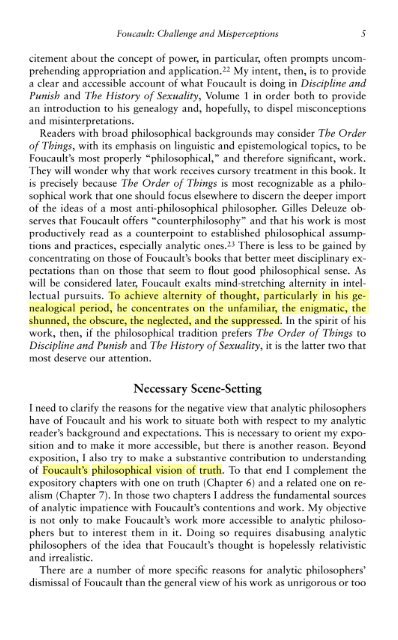Starting with Foucault: An Introduction to Genealogy, Second Edition
Starting with Foucault: An Introduction to Genealogy, Second Edition
Starting with Foucault: An Introduction to Genealogy, Second Edition
Create successful ePaper yourself
Turn your PDF publications into a flip-book with our unique Google optimized e-Paper software.
Fournuit: ChaEEe~zge and Mi~,slter~tr~ti~f~~ 5citement about the concept of power, in particular, often prompts uncomprehendingappropriation and applicatim.2Wy intent, then, is <strong>to</strong> providea clear and accessible account of what <strong>Foucault</strong> is doing in Discipline andPzrrlzish and The His<strong>to</strong>ry offexuali~y~ Vcllwme 1 in order both <strong>to</strong> providean introduction <strong>to</strong> his genealogy and, hopefully, <strong>to</strong> dispel misconceptionsand misinterpretations.Readers <strong>with</strong> broad philosophical backgrotrnds may consider The Orderof Thi~gs, <strong>with</strong> its emphasis on linguistic and epistemological <strong>to</strong>pics, <strong>to</strong> be<strong>Foucault</strong>ss most properly ""philosophical," and therefore significant, work,They will wonder why that vvork receives cursory treatment in this book, Itis precisely because The Order of Things is most recognizable as a philosophicalwork that one should focus elsewhere <strong>to</strong> discern the deeper impor<strong>to</strong>f the ideas of a most anti-philosophical philosopher, Gilles Beleuze observesthat <strong>Foucault</strong> offers "counterphilasopby" and that his work is mostproductively read as a counterpoint <strong>to</strong> established philosophical assumptionsand practices, especially analytic ones.2"FThere is less <strong>to</strong> be gained byconcenmting an those of <strong>Foucault</strong>'s books that better meet disciplinary expectationsthan on those that seem <strong>to</strong> Rout good philosophical sense. Aswill be considered later, <strong>Foucault</strong> exalts mind-stretching alternity in intellectualpursuits, To achieve alternity of thought, particularly in his genealogier-rlperiod, he concentrates on the unfamiliar, the enigmatic, theshunned, the obscure, the neglected, and the suppressed. In the spirit of hiswork, then, if the philosophical tradition prefers The Qder of Things <strong>to</strong>DkcipIine a7zd Pgnish and TI.7e His<strong>to</strong>? Qf Sex~ality, it is the tatter two thatmost deserve our attention.Necessary Scene-SettingI need <strong>to</strong> clarify the reasons for the negative view that analytic philosophershave of <strong>Foucault</strong> and his work <strong>to</strong> situate both <strong>with</strong> respect ta my analyticreader's backgro~tnd and expectations. This is necessary <strong>to</strong> orient my expositionand <strong>to</strong> make it Inore accessible, but there is another reason. Beyondexposition, f also try <strong>to</strong> make a substantive contribution ta understandingof <strong>Foucault</strong>'s philosophical vision of truth, To that end f complement theexposi<strong>to</strong>ry chapters <strong>with</strong> one on truth (Chapter 6) and a related one on realism(Chapter 7). In those two chaptefs I address the hndamental sourcesof analytic impatience <strong>with</strong> <strong>Foucault</strong>'s contentions and work, My objectiveis not only <strong>to</strong> make <strong>Foucault</strong>'s work more accessible <strong>to</strong> amlyric philosophersbut <strong>to</strong> interest them in it. Doing so requires disabusing analyticphilosophers of the idea that Faucaulr's thought is hopelessly relativisticand irrealistic,There are a numlxr of more specific reasons for analytic philosophers"dismissal of <strong>Foucault</strong> than the general view of his vvork as unrigorous or <strong>to</strong>o


